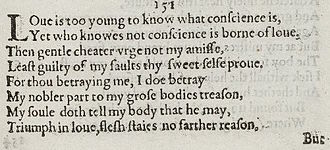| Sonnet 151 | |||||||
|---|---|---|---|---|---|---|---|
 The first eight lines of Sonnet 151 in the 1609 Quarto | |||||||
| |||||||
Sonnet 151 is the 151st of 154 poems in sonnet form by William Shakespeare published in a 1609 collection titled Shakespeare's sonnets. The sonnet belongs to the Dark Lady sequence (sonnets 127–152), which distinguishes itself from The Fair Youth sequence by being more overtly sexual in its passion. Sonnet 151 is characterized as "bawdy" and is used to illustrate the difference between the spiritual love for the Fair Youth and the sexual love for the Dark Lady.[2] The distinction is commonly made in the introduction to modern editions of the sonnets in order to avoid suggesting that Shakespeare was homosexual.[2]
- ^ Pooler, C[harles] Knox, ed. (1918). The Works of Shakespeare: Sonnets. The Arden Shakespeare [1st series]. London: Methuen & Company. OCLC 4770201.
- ^ a b Matz, Robert (2008). The World of Shakespeare's Sonnets: An Introduction. p. 111. ISBN 978-0-7864-3219-6.